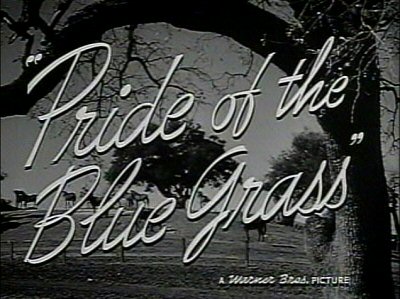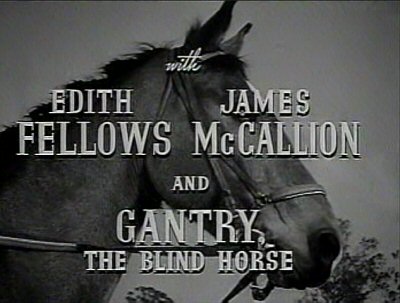Aug. 24, 2009 —


Pride of the Bluegrass, 1939
Time, Oct. 31, 1938:
Last week the Horse Show committee of Nebraska’s famed Ak-Sar-Ben celebration brought to Omaha for a personal appearance a blind horse named Elmer Gantry, who was remarkable not simply because he was still alive but also because he had been taught to jump.
 Fourteen years ago Eleanor Getzendaner, a young wrangler who was riding as a jockey at outlaw tracks and country fairs, saw Elmer Gantry when he was a thoroughbred yearling on a southwestern Nebraska ranch. She tried to buy him, failed because the price was too high. She kept her eye on him. Few years later, after he had been wintered outdoors in a poor pasture until he was so thin and rough as to be practically valueless, she was able to buy him for a song. She found him amazingly intelligent and adaptable, soon had him trained as a race horse, cow pony, hurdler, show horse, triple-bar exhibition jumper.
Fourteen years ago Eleanor Getzendaner, a young wrangler who was riding as a jockey at outlaw tracks and country fairs, saw Elmer Gantry when he was a thoroughbred yearling on a southwestern Nebraska ranch. She tried to buy him, failed because the price was too high. She kept her eye on him. Few years later, after he had been wintered outdoors in a poor pasture until he was so thin and rough as to be practically valueless, she was able to buy him for a song. She found him amazingly intelligent and adaptable, soon had him trained as a race horse, cow pony, hurdler, show horse, triple-bar exhibition jumper.
When he was eleven, Elmer Gantry had his first attack of periodic ophthalmia (blindness). Two years later the attacks came so frequently that all he could do was to stand listless and dejected in his stall, graze haltingly through the pasture.
In the field he stood near the other horses for guidance, becoming panic-stricken when they got out of hearing.
When both his eyes were completely covered by cataracts, the sickness that comes with the attacks passed. At the sound of other horses going out for their rides Elmer Gantry whinnied nervously, stamped, pawed the ground with impatience. Miss Getzendaner decided to take him out. At first he stumbled hesitantly and nervously over the ground, but he seemed to like it. In the beginning she would only let him walk, after a few weeks allowed him a tentative trot, finally a gallop.

As his ears and her voice replaced his useless eyes, the horse no longer picked his feet high off the ground at every step in fear that a ditch, a tree, a root or a hollow might trip him. Gradually he became more & more excited when he was in groups of other horses, used to lunge and try to race. Once, when Miss Getzendaner gave the first signal at a ditch, he jumped it instead. She decided then to try to train him to jump.

The job took all her patience. Main trouble was that, like blind people, he anticipated objects, and consistently hesitated on his third stride toward the jump. She worked out a group of signals: “come on,” “ready,” “gather for the jump,” “hup” for the actual leap itself.

Then she taught him to walk up and touch the jump with his breast to judge its height, canter down and turn, settle into his old, familiar stride again. Soon she had him doing high hurdles.

When amazed animal trainers comment on Gantry’s unusual good health and apparent happiness, proud Eleanor Getzendaner always quotes: “It is not miserable to be blind; it is miserable not to be able to endure blindness.”
Horse Hosts Press, Boxoffice, Nov. 18, 1938, p.52:
Members of the Chicago press had a new experience this week – having breakfast with a horse as the host.
The host was Elmer Gantry, 15-year-old blue-blooded blind horse, owned by Eleanor Getzendaner of Des Plaines, Ill., and signed on Monday by Warner’s Bryan Foy to a contract for the forthcoming picture, “Gantry the Great.”
The picture will be based upon the incidents in the life of the horse and its owner. Details of the story were given to the press at a breakfast Monday at the Blackstone, aster which all journeyed to Des Plaines to witness the signing ceremonies (the newsreels were there, too), and to see the horse go through its paces.
Here with Foy were Vincent Sherman, who wrote “Crime School,” and is working on the screenplay for “Gantry the Great” …
One anecdote … bears repeating: Miss Getzendaner insisted, when discussion began, on using the horse in a picture that Warners sign “Elmer the Great” himself and that the contract should not be made with the owner. Asked why she was so insistant on it, she answered, “Well, who’s going to take care of “Elmer” on his social security when he gets old, if you don’t sign him up himself?”
